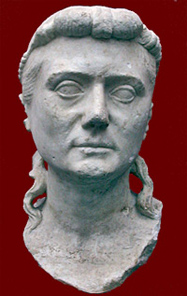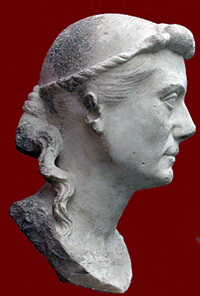 |
 |
Laelia was the daughter of C. Laelius (c. 190-129 BCE) and the wife of Q. Mucius Scaevola (c. 159 – 88 BCE), with whom she had three children. We know very little else about her, reinforcing the impression that her daughter's husband, the orator L. Licinius Crassus (140-91 BCE), conveys of a sheltered but educated woman. Aristocratic matronae would typically have received early instruction at home with their brothers, but how much more education they would have acquired is uncertain. Crassus implies that Laelia had knowledge of the early dramatic poets Plautus and Naevius, or at least sounded as if she had. Although teachers were usually mothers or, in elite households, Greek tutors, Crassus cites only Laelia's father as her model. Laelius was a statesman and member of the Scipionic Circle, a group of cultured friends who gathered around Scipio Africanus Numantinus, victor in the 3rd Punic War (149-146 BCE). Renowned for his oratorical ability, Laelius earned the nickname Sapiens for his interest in Greek philosophy and literature. He was praised for the elegance of his language by Quintilian, who agreed that Laelia spoke like her father. In the passage below Crassus, one of the speakers in Cicero's dialogue on rhetoric, argues that good Latin pronunciation mirrors ancient Roman diction, the only remaining traces of which he finds in the speech of his mother-in-law, Laelia. |
|
Elderly Roman Woman 1st century BCE |
||
| Equidem cum audio socrum meam Laeliam – facilius enim mulieres incorruptam antiquitatem conservant, quod multorum sermonis expertes ea tenent semper, quae prima didicerunt – sed eam sic audio, ut Plautum mihi aut Naevium videar audire, sono ipso vocis ita recto et simplici est, ut nihil ostentationis aut imitationis adferre videatur; ex quo sic locutum esse eius patrem iudico, sic maiores; non aspere ut ille, quem dixi, non vaste, non rustice, non hiulce, sed presse et aequabiliter et leniter. | |
Click on the underlined words for translation aids and commentary, which will appear in a small window.